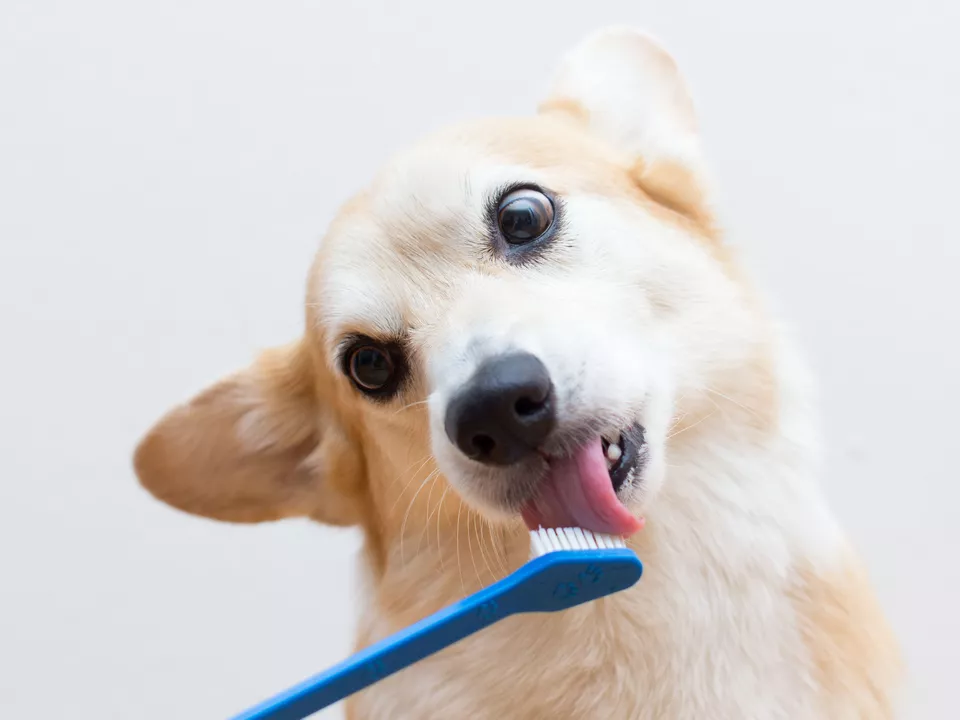
Puppy grooming goes beyond hair care and grooming and includes brushing your puppy’s teeth. Puppy breath can be a pleasant aroma when the pooch is quite small, but while a stinky mouth odor means you won’t welcome those close snuggles, it also points to potentially painful and dangerous dental problems.
By the time dogs reach the age of three years, 80 percent of them have some amount of dental disease. That makes sense because dogs don’t brush their teeth, and they tend to gulp rather than chew their food. Just think what your teeth would look like in three years if you never brushed!
Since adult dogs often object to tooth brushing, it’s best to start puppies with a dental hygiene program while they’re too little to argue and consider it a game or a treat.
Crunching dry food reduces dental problems by about 10 percent, compared to canned food that sticks to teeth. If you feed both, encourage your puppy to crunch the dry after the wet appetizer.
Many dogs relish healthy people foods like raw veggies or fruit, and chewing on these “detergent” foods can help scrub teeth clean. Offer your puppy carrots or apple slices for healthy natural dental snacks.
Special “dental diets” and treats available in grocery stores or dispensed from the veterinarian can help especially with dog breeds that seem more prone to dental issues like Yorkshire Terriers. Look for sodium hexametaphosphate (sodium HMP) listed in the food which helps prevent plaque from attaching to teeth.
A wide range of commercial dental chews (rawhide, ropes, treats) available for dogs may also prevent doggy breath. Some are infused with special enzymes that kill bacteria and help prevent plaque. Also, ask your vet about dental rinse products.
· M
· M Most veterinary dentists dislike cow bones, pig hooves and other hard chew objects that may break your puppy’s teeth. Sterilized bones designed for doggy dental care, though, may be just the ticket.
Affer your dog an approved object to chew on that also has dental benefits, like the “dental toys” that contain a nubby surface designed to scrub the teeth.
When your dog struggles with tooth problems, the best way to maintain dental health is to brush your puppy’s teeth. Here’s how:
00001. Over the course of several weeks, get your puppy accustomed to having his mouth handled. You can get pups used to having something inserted into their mouth by flavoring your finger with low-salt chicken broth. Try clicker training to communicate to your puppy what you want him to do.
00002. Offer doggy toothpaste as a treat. Special meat-flavored toothpaste is available from pet product stores or your veterinarian and it gives pups the incentive to open wide. Never use human toothpaste. Puppies can’t spit so they end up swallowing the foam, and fluoride can be dangerous and damage your puppy’s internal organs.
00003. Once they accept mouth handling and like the toothpaste, try propping the puppy’s mouth open with a favorite toy. Simply encourage him to bite on a chew object, and wrap your hand around his muzzle to hold it in place. That gives you access to his open mouth and also gives him something to do with his teeth. Practice doing this several times and praising him while giving toothpaste treats before you introduce a toothbrush.
00004. Special pet toothbrushes are smaller and may be designed to better fit the dog’s mouth. A soft child’s toothbrush also works well.
00005. Some puppies better accept your finger. Finger toothbrushes are available for brushing pet teeth, or simply wrap a damp cloth around your fingers and use that to scrub the outside of his teeth. Puppy tongues clean the inside surface of teeth so you won’t have to worry about poking too far inside the mouth.
00006. Brushing after every meal is recommended, but two to three times a week is a good schedule. Always be sure to praise your pup and offer affection after so the experience leaves a good taste—literally!
Tel: 86-180-1316-1895
Email: dogcat2021@163.com
Add: No.100,Liuli PLAZA,SIP, Jiangsu